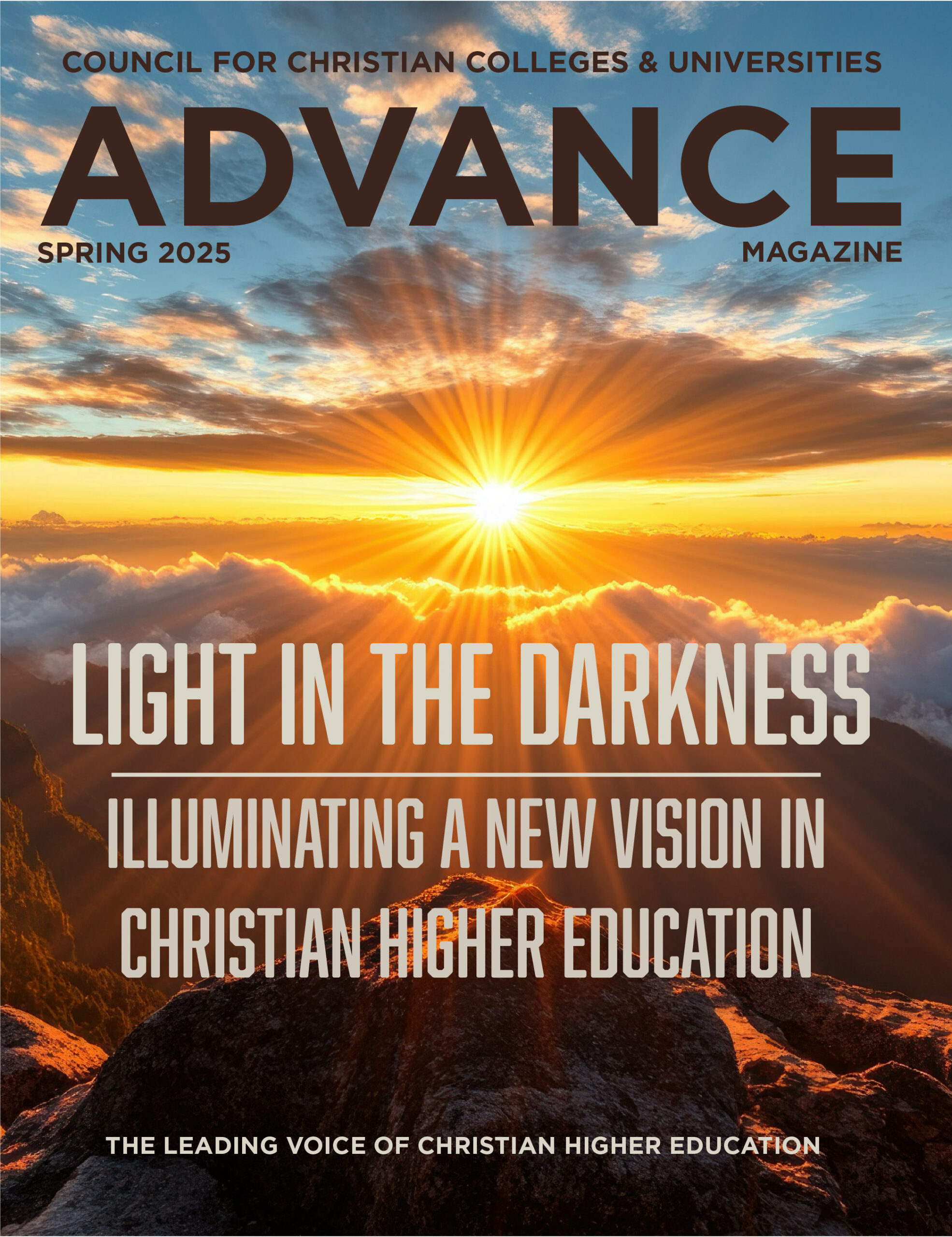Magazine
Higher education is undoubtedly experiencing a challenging season. From external media circles to internal boardroom meetings, the challenges are discussed and debated daily. These challenges are often brought about by society’s perception of higher education’s purpose. Christian institutions are impacted by these challenges but additionally experience a different kind of perception… one that is often inaccurate and uninformed. The general perception, outside Christian circles, is that Christian higher education is not as academically competitive, economically valuable, or research-driven as secular education. In reality, Christian institutions provide academic, research, and industry practice that often surpass that offered by many of their secular counterparts.
The American higher education system is rooted in faith. In A History of American Higher Education, John Thelin stated that, “religion occupied a central but confined place in the colonial colleges.” Completing a degree program was rare, as, according to Thelin, less than one percent of the colonial population was college-educated and “there is little evidence that any of the colonial colleges ever enrolled more than a hundred students in a single year.” Thelin stated that many of America’s founding fathers were first-generation college students themselves and universities of the time “combined strong Christian faith with secular resolve.”
After the Revolutionary War, higher education adapted and evolved, as did the public perception of its necessity and value. Throughout the nineteenth and twentieth centuries, cultural, political, and social changes greatly influenced academic goals and objectives. Some Christian universities experienced a “mission-drift” while others remained steadfast in Christian vision and mission, ensuring that all aspects of the university system were aligned with a faithful, biblical understanding of Christ’s purpose.
Throughout the twentieth century, higher education revamped its image. Higher education was no longer exclusively for the elite but became attainable for all, especially with the advent of scholarships, financial aid, and the GI Bill. After the tumultuous years of the Great Depression and World War II, an outcome-based education providing sustainable skills appealed to many.
Dietrich Bonhoeffer once proclaimed that, “God does not give us everything we want, but He does fulfill His promises, leading us along the best and straightest paths to Himself.” This is promise fulfilled at Christian institutions across the globe. However, paths in higher education are rarely straight; instead, they wind and twist, challenged daily by cultural and political pressures. The need to adapt but remain faithful and mission-driven creates a constant social balance between expectations, perceptions, and assessment of both the tangible and intangible outcomes of education.
The current perception is that higher education must be transactional in order to be valuable. Thus, the strength of programs is constantly tested and reframed based on its direct connection to a measurable career path. For example, a 2024 report from Pew Research titled “Is College Worth It?” exclusively assessed financial metrics, including full-time employment, median earnings, and poverty levels. Conversations about higher education in the media and on Capitol Hill often emphasize the concept of ROI, or return on investment. According to these conversations, higher education is only “worth it” when a diploma funnels graduates into high-paying jobs.
Of course, the true value of Christian higher education surpasses simple financial calculation. Christian college campuses are sites where the love of truth, wisdom, and beauty thrive, as students simultaneously deepen their love for the Lord, develop their intellectual capacity, and, yes, learn practical skills that will serve them throughout their careers and their lives.
Here, the central misconception about Christian higher education rears its head. Do Christian colleges and universities offer robust and rigorous academic programs? Do they competitively prepare graduates to enter the workforce and thrive in the modern world?
In the words of Pew Research Center from “In America, Does More Education Mean Less Religion?,” “The idea that highly educated people are less religious, on average, than those with less education has been a part of the public discourse for decades.” Implicitly, this view suggests that advanced learning and faith are incompatible—a view that naturally extends to diminish the strength, relevance, and legitimacy of Christian colleges and universities. However, Pew’s findings from 2017 already begin to unravel this narrative.
While it is true that a smaller percentage of college graduates profess a belief in God or say they pray regularly, Pew’s research found that among Christians, those with higher levels of education are as likely or more likely to express high levels of religious commitment. Faith and higher education can, of course, go hand in hand—and at Christian colleges and universities, students can intentionally deepen their faith while pursuing a meaningful, and academically competitive, education.
Christian institutions are heavily engaged in innovative research. At Abilene Christian University (Abilene, TX), the Nuclear Energy eXperimental Testing (NEXT) Lab conducts research utilizing molten salts in nuclear energy to support academic research. According to the ACU website, “The Nuclear Regulatory Commission (NRC) has issued a construction permit to Abilene Christian University to build the Natura MSR-1, marking the first liquid salt fueled reactor licensed by the NRC in American history and the first U.S. university research reactor approved in more than 30 years.” The website goes on to say, “The mission of ACU’s NEXT Lab, powered by Natura Resources, is to provide global solutions to the world’s need for energy, water and medical isotopes by advancing the technology of Molten Salt Reactors while educating future leaders in nuclear science and engineering.” In August 2024, Senator Ted Cruz visited the facility and met with faculty and students to discuss their groundbreaking research.
At Charleston Southern University (Charleston, SC), students are enrolled in the four-year-old aeronautics program, working toward a Bachelor of Science in a Federal Aviation Administration (FAA)-certified program. According to the CSU website, “The CSU aeronautics program that started less than four years ago has grown from 19 students to more than 150 students. Year over year, the program has seen a 33% enrollment growth in its three degree tracks: professional pilot, aerospace management, and aviation maintenance management.” Charleston Southern University is a leader in flight-school training, purchasing a flight training school in 2025 while also planning a flight simulation lab.
A flight school was also announced in April 2025 at John Brown University (Siloam Springs, AK), partnering with ARH Aviation to enable students to complete pilot training while earning a Bachelor of Science degree, taking professional flight courses in addition to a business core and technical electives. The university is addressing the industry need for certified pilots by providing applied training and specializations to make them among the best in the air.
Business leaders learn from Christian education as well. At Biola University (La Mirada, CA) in southeast Los Angeles County, In-N-Out leaders learn in a cohort taught by professors from the Crowell School of Business and the School of Fine Arts and Communication in a program “aimed to increase their knowledge and understanding of financial, operational and strategic concepts and how they function within the In-N-Out business model…. One of the mutual points of understanding between In-N-Out and Biola was that the curriculum was faith-based and emphasized Christian values,” according to the Biola University website.
Students at Christian universities are enthusiastic about serving others while making a positive impact in the world. In February 2025, students from Ouchita Baptist University (Arkadelphia, AK), published research findings in microPublication Biology, a national peer-reviewed, open-access scientific journal. Students began their research in a biology class and, according to a university press release, “decided to continue research on miR-127, a molecule found by a previous Ouachita research team to be linked to breast cancer.” Christian higher education students are contributing to the fight against cancer with their research advancements and progress.
Meanwhile, at Dordt University (Sioux City, IA), experienced and faithful agriculture faculty teach students. “Dordt’s Agriculture Service Technology courses blend hands-on learning with a strong biblical foundation and workplace skills that will equip you to serve as a technician in a John Deere dealership,” in the words of Dordt University’s website. The partnership between Dordt and AgriVision Equipment is highly successful since the first cohort began in the fall of 2024 and ensures that students have a promising future while living Dordt’s mission of “work[ing] effectively toward Christ-centered renewal in all aspects of contemporary life.”
From the east coast to the west coast and everywhere in between, Christian colleges and universities are actively working to prepare students for a faithful calling that combines professional fulfillment and a life of service according to God’s purpose—and universities are not the only ones telling their stories of success. Christianity Today journalist Hannah McClellan wrote in a January 2025 article that, “Religious schools have fared the best… According to 2021 enrollment data from the Digest of Education Statistics, schools with religious affiliation saw student declines of just 3 percent in 10 years. Secular private schools, by comparison, have had the greatest declines, losing 18 percent of their student population in that same period…. And evangelical schools appear to be doing better than other religious-affiliated institutions.” Sara Weissman at Inside Higher Ed wrote an article in November 2024 about the positive upward trend in Christian higher education. Weissman wrote that, “Leaders of religiously affiliated colleges say enrollment at small, relatively strict faith-based institutions is booming.”
Students, and their families, can tell that Christian institutions of higher education offer something special: a diverse range of degree programs, which foster academic excellence and remain rooted in the Christian faith.
As history shows, despite inaccurate and limited secular media perceptions, higher education has endured throughout countless seasons of change. Evolution in student population, academic programming, and community engagement is blended with the foundation of faith and scholarship at Christian colleges and universities. Christian higher education remains strong, nourishing the hearts, souls, and minds of generations of students.
__________
Dr. Amanda Staggenborg is the chief communications officer for the CCCU.




